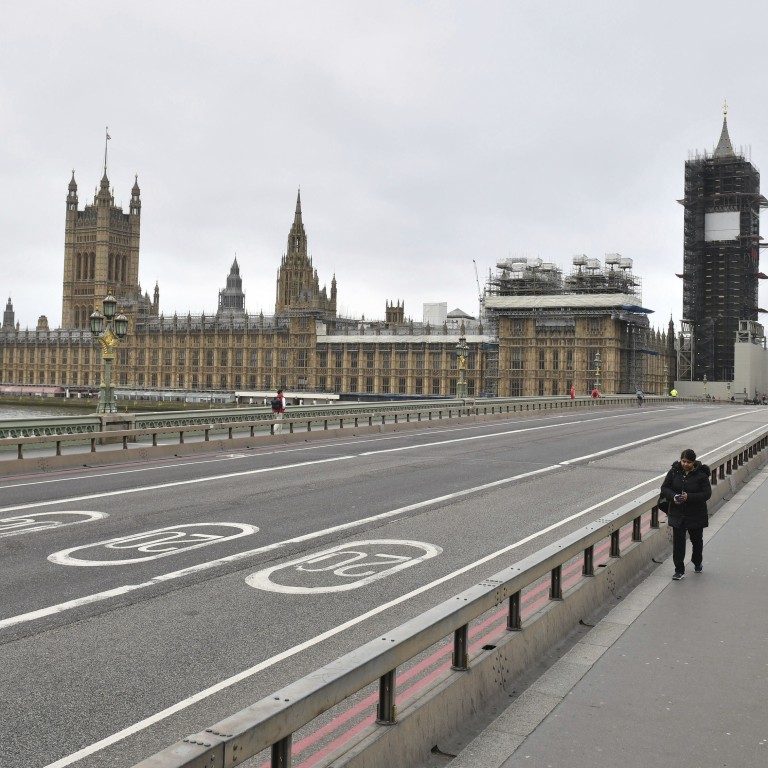
Coronavirus: global recession in 2020 now seen as guaranteed as outbreak ravages Europe, US
- Hope for rapid global economic recovery has faded, with some analysts predicting the downturn may last until next year
- Escalation of containment measures in Europe and the US, along with weak Chinese economic data, are seen as tipping points in the outlook for the economy
A global economic recession is now all but guaranteed in 2020, with analysts worldwide continuing to slash their already grim forecasts as the rapid spread of the coronavirus pandemic outside China results in unprecedented containment measures and a rising number of businesses in danger of bankruptcy.
The question now becomes how deep the downturn will be, and how long it will last, with worst-case scenarios seeing weak growth continuing into 2021.
The International Monetary Fund defines a recession as an annual global growth rate below 2.5 per cent. The global economy grew only 2.9 per cent last year.
The increasing restrictions on public gatherings and travel plans, the downturn in Europe is likely to be deeper than previously expected
“The spread of the virus, which the World Health Organisation declared to be a pandemic on March 11, appears to be stabilising in much of Asia.
“However, the increasing restrictions on person-to-person contact in Europe and the US have sent markets reeling as risk-aversion rises and views on economic activity, earnings, and credit quality deteriorate sharply.”
“We had anticipated a further spread of the virus in our original forecast. However, we had not expected the whole of Italy to go into lockdown,” said Schroders chief economist and strategist Keith Wade.
“When combined with the ongoing likelihood of the virus accelerating elsewhere, and the increasing restrictions on public gatherings and travel plans, the downturn in Europe is likely to be deeper than previously expected.”
The knock-on effect of Italy’s shutdown across Europe would mean negative growth in 2020, Wade added.
An enormous first quarter shock in China, shutdowns across the US and Europe, and local virus transmission guarantees a deep recession across Asia-Pacific
“Such an outcome would make this year the weakest since 2009, the height of the global financial crisis,” Wade said.
“An enormous first quarter shock in China, shutdowns across the US and Europe, and local virus transmission guarantees a deep recession across Asia-Pacific,” S&P Global Ratings chief Asia-Pacific economist Shaun Roache said.
Covid-19 would also tip Australia – which has not had an economic downturn in nearly 30 years – into a recession, ANZ Research said.
Unemployment is also expected to rise to 7.8 per cent by the end of the year, from around 5.1 per cent in January, with policy stimulus expected do little to halt job losses and business closures, the group added.
While governments raced to cut rates and plump up stimulus packages, these measures would only cushion not reverse the shocks, S&P said. The impact of local measures, such as the new US proposal to send money to every household, would wane the longer the crisis lasted.
Increasingly, analysts said there was no longer much chance of a V-shaped recovery – a sharp decline following by an equally strong rebound as pent up demand spurs economic activity.
The length of time that measures needed to control the spread of the virus are kept in place will be one key factor determining the duration of the economic hit. How quickly consumers are willing to resume spending and businesses resume investing given lingering questions about the virus are also expected to define the pace and duration of the recovery.
Britain, in announcing its £330 billion (US$400 billion) stimulus package on Tuesday, said lockdowns could last up to 18 months until a vaccine becomes available, while the Australian government said quarantines could continue for six months.
The recession could, though, be made more intense if central banks run out of measures to help support their economies, analysts said.
Interest rates in many countries are already at or near historic lows, and with the recent sharp drop in oil prices already posing a danger of global deflation, central banks will be hard-pressed to cut interest rates further, Morgan Stanley said.
The US Federal Reserve have already resumed that strategy, unleashing US$700 billion in quantitative easing, with an initial US$40 billion injection on Monday.
In comparison, the US central bank engaged in three rounds of quantitative easing in response to the global financial crisis just over a decade ago.
Purchase the China AI Report 2020 brought to you by SCMP Research and enjoy a 20% discount (original price US$400). This 60-page all new intelligence report gives you first-hand insights and analysis into the latest industry developments and intelligence about China AI. Get exclusive access to our webinars for continuous learning, and interact with China AI executives in live Q&A. Offer valid until 31 March 2020.

